Mumbai: Even as the Bombay high court is trying to ascertain whether a secret nass of succession was conferred upon original plaintiff Syedna Khuzaima Qutbuddin by the 52nd Dai in December 1965, defendant Syedna Mufaddal Saifuddin’s counsel informed the bench that the nass conferred upon him in January 1969 was also kept secret but had three witnesses.
These witnesses, Justice Gautam Patel was informed, had made a note of the event in their personal journals, which were used to prove the validity of the nass. The 52nd Dai had also handed over a treatise to his two sons in 2005 by which they knew that Syedna Saifuddin would be the next Dai.
Narrating the events surrounding the conferment, senior counsel Janak Dwarkadas said that the 52nd Dai had given a sermon on the evening of January 27, 1969, a day prior to his departure for Hajj. After the sermon, he retired to his personal chamber. However, at around 1 am, he summoned his personal secretary Ebrahim Yamani. Abdul Hussain Tambawala, a businessman, and Abdul Qadir, father-in-law of one of the Dai’s sons, were also present.
Dwarkadas submitted that on the instructions of the Dai, Yamani made an entry in a notebook, which was in the custody of the spiritual leader, which said that he was conferring nass on his son, Mufaddal Saifuddin. The Dai then made some corrections and put his signature below the statement.
The bench was informed that the notebook was inspected by the plaintiffs’ counsels when it was first produced during the trial. But though the plaintiffs had cast doubts on the authenticity of both the handwriting of Yamani and the signature of the 52nd Dai, they had not given any evidence to prove their claim of it being unreliable.
Apart from the notebook entry, Yamani, who had started maintaining a daily journal after 1965, had also made a note of the conferment in his journal, and Tambawala had noted it in his calendar dairy. Both were made available to the defendant by the community repository after the June 2011 announcement of nass. Dwarkadas submitted that in all there were 11 documents and oral evidence which corroborated the 1969 nass.
The bench was informed that though the nass was conferred in January 1969, the 52nd Dai had instructed the witnesses to keep it confidential, and hence they did not disclose it to anyone.
While replying to the objection of the plaintiffs that if nass had been conferred on the defendant in 1969, why it was done again in November 2005 and twice in June 2011, Dwarkadas submitted that in 2005, the 52nd Dai had informed only his sons, Shehzadas Qaid Johar and Malekul Ashtar, who were also told to keep it confidential. However, in June 2011, after the Dai’s hospitalisation, Qaid Johar informed the defendant and his family and said that the leader had done nass previously as well.
At this point, Justice Patel sought to know why the 1969 nass of the defendant, who was the son of the 52nd Dai, was kept a secret, and if there were witnesses to it, what their conduct towards the defendant was thereafter. Dwarkadas replied that the reason behind the secrecy could be known only to the 52nd Dai but the fact that he had asked the witnesses to keep it confidential could be the reason for their ‘normal’ behaviour towards the defendant after 1969. The plaintiffs had pointed out that there was no change in conduct by the witnesses towards the defendant after the alleged nass in January 1969, and hence the claim could not be accepted.
Source: https://news.google.com/__i/rss/rd/articles/CBMiiwFodHRwczovL3d3dy5oaW5kdXN0YW50aW1lcy5jb20vY2l0aWVzL211bWJhaS1uZXdzLzE5NjktbmFzcy1vbi1kZWZlbmRhbnQtd2FzLWFsc28tY29uZmlkZW50aWFsLWJ1dC1oYWQtdGhyZWUtd2l0bmVzc2VzLTEwMTY3MTU2MjA5NDY0OC5odG1s0gGPAWh0dHBzOi8vd3d3LmhpbmR1c3RhbnRpbWVzLmNvbS9jaXRpZXMvbXVtYmFpLW5ld3MvMTk2OS1uYXNzLW9uLWRlZmVuZGFudC13YXMtYWxzby1jb25maWRlbnRpYWwtYnV0LWhhZC10aHJlZS13aXRuZXNzZXMtMTAxNjcxNTYyMDk0NjQ4LWFtcC5odG1s?oc=5

